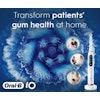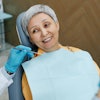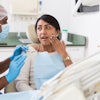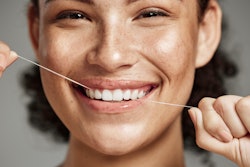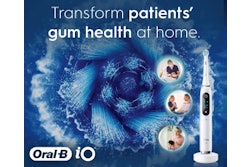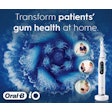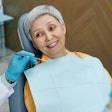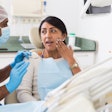Maintaining good oral hygiene is essential for an individual’s overall well-being from early childhood through adolescence to late adulthood. Poor oral hygiene could increase a person’s risk for a variety of health conditions, including periodontal disease, which can cause a loss of teeth. The effects of poor oral hygiene extend well beyond the mouth to an increased risk of cancer, heart disease, and diabetes. Moreover, oral hygiene and health also can affect a person’s mental health and self-image.
 Becky Smith, CRDH, EdD, FADHA, president of the American Dental Hygienists’ Association.
Becky Smith, CRDH, EdD, FADHA, president of the American Dental Hygienists’ Association.
“Research shows that oral health is connected to systemic health. Many of the health problems that we have systemically actually start in the mouth,” says Becky Smith, CRDH, EdD, FADHA, president of the American Dental Hygienists’ Association (ADHA). “For example, there is a bidirectional relationship between periodontal disease and diabetes. There are links between pancreatic cancer and oral health and periodontitis and between Alzheimer's disease and periodontal problems.”
Older people who don’t brush their teeth are susceptible to pneumonia. “They can aspirate bacteria from their mouth into their lungs that may cause breathing issues and respiratory disorders, such as pneumonia,” Smith added.
Signs of poor oral hygiene
Without proper oral hygiene, the following conditions can occur:
- Bad breath
- Plaque accumulation
- Bleeding gums
- Periodontal disease
- Oral thrush
- Mouth sores
- Cavities
Give children an early start to good nutrition and hygiene
Smith indicates that parents should explain the importance of good eating habits and nutrition to their children when they first start eating, so they understand how sugar and bacteria damage teeth. “Children mimic their parents, and if the child sees their parents brushing their teeth, children will do what their parents do,” Smith said.
She suggests that parents start early with an oral hygiene routine with their child that begins with using a finger sock for the purposes of cleaning the gums before teeth have erupted. The idea is to rub the gums to remove any buildup of plaque biofilm. Later, when the child does have teeth, they are accustomed to having their parent’s finger inside their mouth to clean the gums. Additionally, they won't put up so much of a fuss when a toothbrush is introduced.
Dr. Scott Cashion, MS, president of the American Academy of Pediatric Dentistry (AAPD), agrees with Smith. “Oral hygiene is extremely important, especially for children, because if a child’s teeth are not healthy, they are not going to be able to concentrate in school. Their tooth may be hurting, and they won’t be able to focus on their lessons. Taking care of their teeth by visiting a dentist on a regular basis, brushing at least twice a day at home, and maintaining proper nutrition will help children avoid cavities and other dental problems,” Cashion said.
 Dr. Scott Cashion, MS, president of the American Academy of Pediatric Dentistry.
Dr. Scott Cashion, MS, president of the American Academy of Pediatric Dentistry.
“It’s important for parents to start brushing their child’s teeth right after the first tooth comes in,” explained Cashion. “They should have their first dental visit by age 1, or when the first tooth comes in the mouth, not only for the child’s oral health and hygiene but also to educate the parents about brushing techniques, signs of poor oral health, what good nutrition is, and how they can make oral hygiene fun for children if they’re resisting teeth brushing and visiting the dentist.”
Early oral hygiene challenges
Young children may find it challenging to brush their teeth properly because they may not have much manual dexterity. Smith recommends using a large-handled toothbrush that children can easily wrap their hands around and instructing them to brush in a circular motion from top to bottom and across the back and front teeth, cheek-side and tongue-side.
“I tell the parents to let the child try brushing their teeth, but they should also brush their child’s teeth to make sure they are clean. Use a small rice- or pea-sized amount of toothpaste because they may swallow it. Start on a different area of the mouth each time you brush,” Cashion said. “My rule of thumb is when they can tie their shoes, they probably will have the dexterity to brush and keep their teeth clean. Children should start flossing when there are a few teeth in the mouth. Teeth get pretty close together by the age of two. And they should use mouthwash once they learn how to spit,” notes Cashion.
Indications of poor oral hygiene for Cashion include plaque on the teeth, which in a child’s mouth may appear as a light film, as well as a dark black or brown spot on a tooth, which might be a cavity or indicate that something bad is happening to that tooth.
To help introduce young children to good oral hygiene, the AAPD operates MyChildrensTeeth, which offers tips for infants to adolescents.
As with older people, children should visit a dentist at least twice a year or more frequently if they are having issues with their teeth, Cashion said.
Cashion added that if parents are concerned about an upcoming dental appointment for their child, or are nervous themselves, they should be more vague in discussing the visit in front of them, since children are very perceptive and may become anxious about the visit themselves. A good dentist establishes a good rapport with the child and explains things on the child’s level, he stated.
Growing up and introducing more refined oral hygiene cleaning techniques
Smith believes children can start using mouthwash at age 6 or 7, or whenever they know how to spit, so they don’t swallow the mouthwash, which may contain alcohol and fluoride. “As children get older and have better manual dexterity, we can introduce more refined techniques to clean their teeth better. For example, some adolescents have orthodontic braces and must learn how to brush around the orthodontic hardware differently than if they didn't have the braces,” Smith said.
As children grow older, parents may have to have several conversations with them to be certain that they are using proper brushing techniques and that they realize the social importance of good oral hygiene -- not having bad breath, cavities, or yellow teeth.
Children should see a dental hygienist, who can evaluate their brushing technique and self-care routine; educate them about different brushing methods; and introduce them, as they get older, to supplemental aids that might help them, such as a proxabrush, an end-tuft brush, a tongue cleaner, and a water flosser, Smith added.
Depending on the condition of the child’s teeth, a dentist or dental hygienist may recommend different brushing techniques, such as the Stillman method, in which the bristles are held at a 45° angle toward the gum line. Half of the bristles cover the gums while the other bristles cover the teeth’s surface. Short and light horizontal movements remove the plaque from above and slightly below the gumline.
Oral care issues that come with growing older
Older adults should see a dental hygienist to be evaluated so they can maintain optimal oral health, Smith declares. As people age, their teeth may shift to the front of the mouth, causing more crowding, and the teeth are more difficult to clean.
Manual dexterity problems may also occur as older people have arthritis. “Use a toothbrush with a big handle, or modify the brush by taking a tennis ball and punching the handle through the tennis ball so your hand is wrapped around the ball and it's not so painful to brush,” Smith suggested.
“As we age, being able to control modifiable risk factors like smoking and stress also will help oral health,” Smith said. Other issues that may occur as people age include gingival recession -- receding gums -- which exposes the roots of teeth, making them more susceptible to cavities. In addition, as people age, they may take certain medications that cause dry mouth that will promote cavity formation and tartar buildup, Smith added.
A nice smile makes a good impression. More importantly, oral health is a window to overall health and must be taken seriously.
